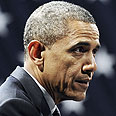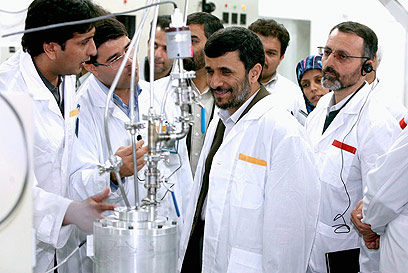
US slaps sanctions on Iranian state-owned bank
Washington imposes new set of restrictions on Iran's third largest bank in effort to make it harder for Tehran to access nuclear program funds. Iran slams move as 'psychological warfare'
The Obama administration on Monday imposed sanctions on Tehran's third largest bank, making it harder for Iran to access the world's financial system and fund its nuclear activities.
Iran's Bank Tejarat, and an affiliate Belarus-based Trade Capital Bank, were blacklisted for providing financial services to other entities already sanctioned for their involvement with the country's nuclear weapons program, the US said.
Related stories:
- Ashton urges Iran cooperation
- EU formally adopts Iran oil embargo
- Obama: Iranian economy in 'shambles'
"Today's sanction against Bank Tejarat will deepen Iran's financial isolation, make its access to hard currency even more tenuous, and further impair Iran's ability to finance its illicit nuclear program," Treasury undersecretary for terror finance David Cohen said in a statement.
Bank Tejarat, which has nearly 2,000 branches in Iran and branches in France and Tajikistan, along with Trade Capital Bank will no longer be able to access the US financial system.
Earlier Monday – and in what has been described as an unprecedented move – the European Union's 27 foreign ministers adopted a decision to impose an oil and petroleum products embargo on Iran.
In a press conference held in Brussels, EU Foreign Affairs Commissioner Catherine Ashton urged Iran to resume negotiations: "We have adopted tough new sanctions on Iran because of the concerns we have over their nuclear program.
"I want to stress, however, that sanctions are not an end in of themselves. We've often talked about this being part of a twin-part approach, that the purpose of sanctions is to put pressure on Iran to come back to the negotiation table.
"That is a message that I have sent consistently through as many channels as I possibly can," she said. "We want to see them come back and either pick up the proposals we put on the table and look at those as potential confidence building measures, or to come up with ideas of their own."

Iranian President Mahmoud Ahmadinejad (Photo: EPA)
The United States welcomed the move. A Joint US Treasury and State Department statement said that the US "welcomes today's decision by the European Union to ban imports of Iranian crude oil and petroleum products, freeze the assets of the Iranian central bank, and take additional action against Iran's energy, financial, and transport sectors.
"The measures agreed to today by the EU Foreign Affairs Council are another strong step in the international effort to dramatically increase the pressure on Iran," the statement said.
'Pychological warfare'
Iran slammed both decisions, accusing the US and the EU of waging "psychological warfare" against the Iranian people.
The Islamic Republic scoffed at the efforts to choke its oil exports, saying that it has Asian nations lined up to buy what Europe scorns.
"European Union sanctions on Iranian oil is psychological warfare ... Imposing economic sanctions is illogical and unfair but will not stop our nation from obtaining its rights," Iranian Foreign Ministry Spokesman Ramin Mehmanparast, said.
Deputy Foreign Minister Abbas Araqchi told the official IRNA news agency that the more sanctions were imposed on Tehran "the more obstacles there will be to solve the issue."
"The European countries, and those who are under American pressure, should think about their own interests. Any country that deprives itself from Iran's energy market, will soon see that it has been replaced by others," Mehmanparast added.
US Secretary of State Hillary Clinton said in a statement with Treasury Secretary Timothy Geithner: "This new, concerted pressure will sharpen the choice for Iran's leaders and increase their cost of defiance of basic international obligations."
Diplomatic sources in Israel told Ynet that "There are many decisions that can be made, but there is only one result by which all of them will be measured – their effectiveness. The ultimate show of success will be the suspension of the Iranian nuclear program and the end of Iran's pursuit of nuclear weapons.
"Now is the time to act because later will be too late. Imposing sanctions for the sake of sanction alone is not enough."
Germany, France and Britain used the EU sanctions as a cue for a joint call to Tehran to renew long-suspended negotiations on its nuclear program.
Russia, like China a powerful critic of the Western approach, said talks might soon be on the cards. Iran, however, said new sanctions made that less likely.
A member of Iran's influential Assembly of Experts, former intelligence minister Ali Fallahian, said Tehran should respond to the delayed-action EU sanctions by stopping sales to the bloc immediately, denying the Europeans time to arrange alternative supplies and damaging their economies with higher oil prices.
"The best way is to stop exporting oil ourselves before the end of this six months and before the implementation of the plan," the semi-official Fars news agency quoted him as saying.
Attila Somfalvi, Dudi Cohen and Yitzhak Benhorin, in Washington, contributed to this report
- Receive Ynetnews updates directly to your desktop











